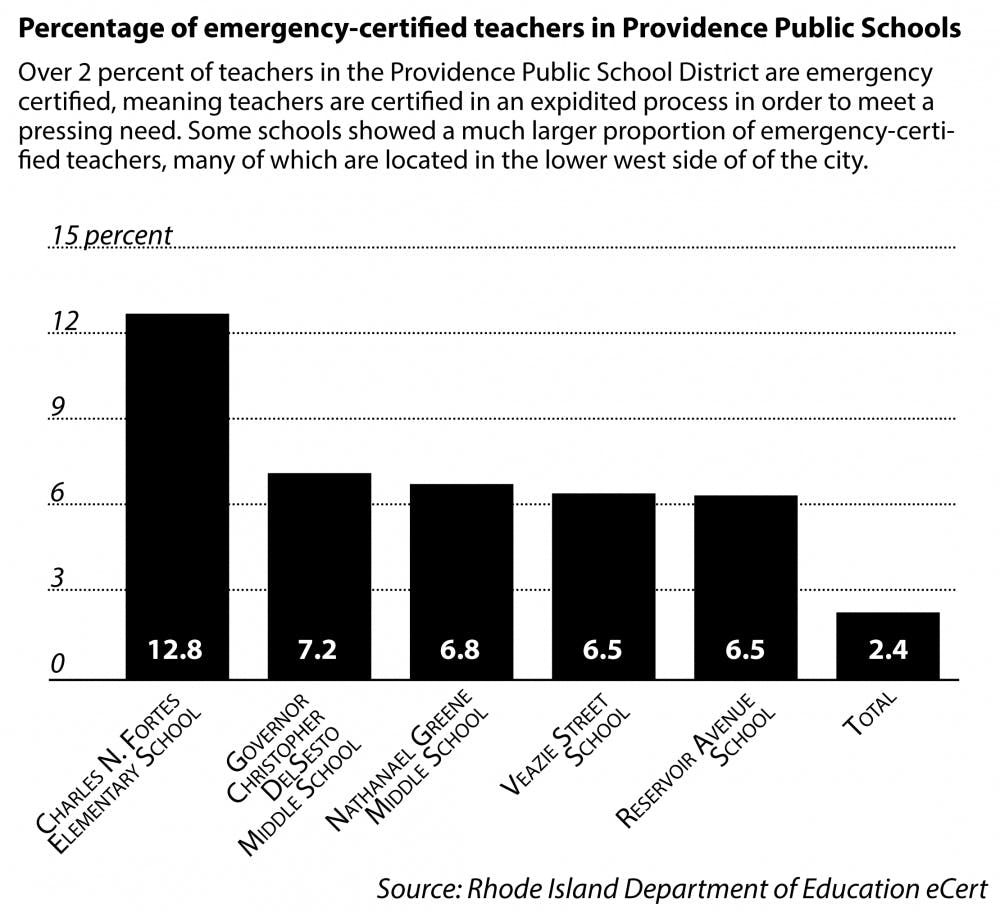Providence — along with three other cities — is “among the large urban school districts having trouble finding teachers,”the New York Times reported Aug. 10, citing the Council of the Great City Schools, an organization composed of large urban schools.
CGCS identified Providence as a school district experiencing a teacher shortage as a result of “responses to a question we posted to our listserv of district representatives,” said CGCS Research Manager Moses Palacios. “The information was gathered from school district responses to an informal question rather than a formal study, survey or data set,” Palacios said.
The council asked the questions, “Are declining applications at Colleges of Education affecting school district recruiting and hiring of teachers?” and “Are you seeing shortages?” CGCS Communications Manger Tonya Harris told GoLocalProv.
“Typically not all districts respond to a listserv question,” Palacios said, adding, “It would be fair to say that Providence is among large school districts having trouble filling teacher vacancies.”
The information obtained from CGCS is not sufficient to support the claim that Providence has a teacher shortage, said Kenneth Wong, professor of education and chair of the department.
Identifying the teacher shortage is done through looking at the number of emergency certifications given to teachers each year, said Elliot Krieger, public information officer for the Rhode Island Department of Education. Emergency certifications are awarded for one academic year, during which teachers work toward their certification “if and only if there are no certified teachers available for that particular job,” Krieger said. Teachers receiving an emergency certification must have a bachelor’s degree, though not necessarily in the area in which they are being certified, Krieger said.
Emergency certified teachers are not necessarily unqualified, but do require extra support, President of the Providence Teacher’s Union Maribeth Calabro said.
For the state as a whole, “we have probably more certified teachers than jobs. We have eight or nine schools of teacher preparation in the state,” Krieger said. In “some areas there’s a surplus. It’s very difficult for newly minted teachers to get a job teaching English or grade-level schooling.”
Out of the some 14,000 teachers across the state, only 180 received emergency certifications, Krieger said. But 74 of those emergency certifications — over 40 percent — are in Providence.
Only 16 percent of the state’s public school population is in the Providence Public School District.
A Herald analysis of the Rhode Island Department of Education’s certification portal, eCert, yielded that there are 2,379 teachers in the Providence Public School District, 56 — or over 2 percent — of which have emergency certifications. The school with the highest percentage of emergency certified teachers is Charles N. Fortes Elementary School with 12.8 percent, followed by Governor Christopher DelSesto Middle School with 7.2 percent.
Providence’s teacher shortage isn’t unique, Calabro said, adding that all urban school districts struggle to “recruit and retain teachers.”
“The teacher shortage has increased over the past few years,” Calabro said. The low salaries, general treatment and “unfair accountabilites that have been put upon us by people who are not in our shoes” contribute to the shortage, Calabro said.
The teacher shortage disproportionately affects certain subjects, Wong said.
“It’s harder to get teachers in math and science areas and to some degree in English as a second language,” Krieger said.
While the number of students per teacher has increased, this is because of a heavy influx of students, resulting in a lack of classrooms, Calabro said. The student-teacher ratio has not been impacted by a teacher shortage, she added.
The teacher shortage is not the problem that Providence should be most concerned with, Wong said. If the Providence Public School District allowed more recent college graduates to become teachers in Providence, the issues involving the imbalance of teachers between certain subject areas and the decreasing number of students going into teaching would be solved, he added.





